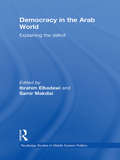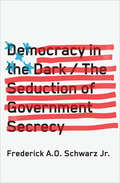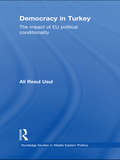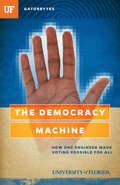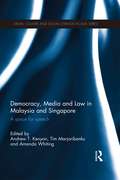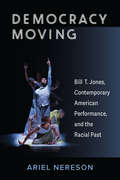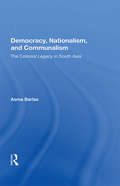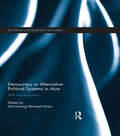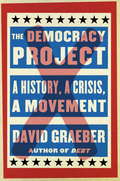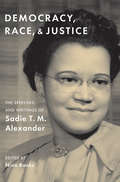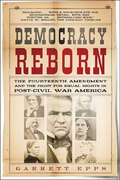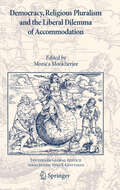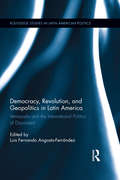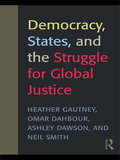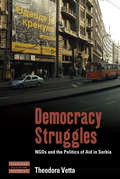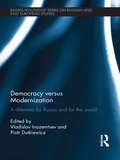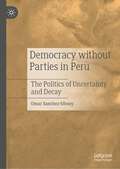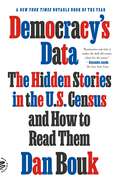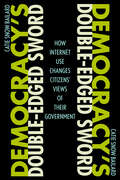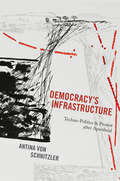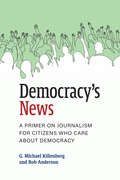- Table View
- List View
Democracy in the Arab World: Explaining the Deficit (Routledge Studies in Middle Eastern Politics)
by Ibrahim ElbadawiDespite notable socio-economic development in the Arab region, a deficit in democracy and political rights has continued to prevail. This book examines the major reasons underlying the persistence of this democracy deficit over the past decades and touches on the prospects for deepening the process of democratization in the Arab World. Contributions from major scholars in the region give a cross country analysis of economic development, political institutions and social factors, and the impact of oil wealth and regional wars, and present a model for democracy in the Arab world. Case studies are drawn from Algeria, Egypt, Iraq, Jordan, Lebanon, Syria, Sudan and the Gulf region, building on these cross-country analyses and probing beyond the model’s main global variables. Looking beyond the effect of oil and conflicts, the chapters illustrate how specific socio-political history of the country concerned, fear of fundamentalist groups, collusion with foreign powers and foreign interventions, and the co-option of the elites by the state contribute to these problems of democratization. Situating the democratic position of the Arab World in a global context, this book is an important contribution to the field of Middle Eastern politics, development studies, and studies on conflict and democracy.
Democracy in the Dark: The Seduction of Government Secrecy
by Frederick A. Schwarz Jr.&“A timely and provocative book exploring the origins of the national security state and the urgent challenge of reining it in&” (The Washington Post). From Dick Cheney&’s man-sized safe to the National Security Agency&’s massive intelligence gathering, secrecy has too often captured the American government&’s modus operandi better than the ideals of the Constitution. In this important book, Frederick A.O. Schwarz Jr., who was chief counsel to the US Church Committee on Intelligence—which uncovered the FBI&’s effort to push Martin Luther King Jr. to commit suicide; the CIA&’s enlistment of the Mafia to try to kill Fidel Castro; and the NSA&’s thirty-year program to get copies of all telegrams leaving the United States—uses examples ranging from the dropping of the first atomic bomb and the Cuban Missile Crisis to Iran–Contra and 9/11 to illuminate this central question: How much secrecy does good governance require? Schwarz argues that while some control of information is necessary, governments tend to fall prey to a culture of secrecy that is ultimately not just hazardous to democracy but antithetical to it. This history provides the essential context to recent cases from Chelsea Manning to Edward Snowden. Democracy in the Dark is a natural companion to Schwarz&’s Unchecked and Unbalanced, cowritten with Aziz Huq, which plumbed the power of the executive branch—a power that often depends on and derives from the use of secrecy. &“[An] important new book . . . Carefully researched, engagingly written stories of government secrecy gone amiss.&” —The American Prospect
Democracy in Turkey: The Impact of EU Political Conditionality (Routledge Studies in Middle Eastern Politics)
by Ali Resul UsulThis book examines the impact of European political conditionality on the process of democratization in Turkey over a twenty year period. Employing theoretical and conceptual approaches to the issue of EU conditionality, the author compares the case of Turkey to that of other European nations. Arguing that Turkey became vulnerable to the European conditionality when it applied for membership in 1987, he shows how the political reforms demanded of Turkey were not fully carried out as the EU had not in essence accepted Turkey as an official candidate during this period. The EU has started to exert real ‘active leverage’ since Turkey was declared an official candidate in 1999, and the author explores how these conditions have exerted a positive influence on democratic consolidation in Turkey. However, its effectiveness in this regard has diminished to a significant extent due to a number of problems that have continued to remain central in EU-Turkey relations. This comprehensive analysis of Turkey-EU political relations and democratization places the case of Turkey within an international context. As such, it will be of interest not only to those studying Turkish politics, government and democracy, but anyone working in the area of international relations and the EU.
Democracy, Inequality and Corruption
by Jong-Sung YouIn this comparative, historical survey of three East-Asian democracies, Jong-sung You explores the correlation between inequality and corruption in the countries of South Korea, Taiwan and the Philippines. Drawing on a wealth of rich empirical research, he illustrates the ways in which economic inequality can undermine democratic accountability, thereby increasing the risk of clientelism and capture. Transcending the scope of corruption research beyond economic growth, this book surveys why some countries, like the Philippines, have failed to curb corruption and develop, whilst others such as South Korea and Taiwan have been more successful. Taking into account factors such as the success and failure of land reform, variations in social structure, and industrial policy, Jong-sung You provides a sound example of how comparative analysis can be employed to identify causal direction and mechanisms in political science.
The Democracy Machine: How One Engineer Made Voting Possible For All
by Jon Silman University of FloridaDriven to make it possible for people with disabilities to vote like everyone else, engineer Juan Gilbert, a specialist in human-centered computing, spent 10 years perfecting Prime III, software that does just that. His creation has already been tested in the real world and is earning rave reviews from elections supervisors around the country. Gatorbytes highlight for the intellectually curious the world of innovative research happening at the University of Florida. Written by professional journalists, Gatorbytes feature the top research and preeminence work being conducted at the University of Florida, written in a way that’s easy to understand.
Democracy, Media and Law in Malaysia and Singapore: A Space for Speech (Media, Culture and Social Change in Asia)
by Andrew T. Kenyon Tim Marjoribanks Amanda WhitingCommentators on the media in Southeast Asia either emphasise with optimism the prospect for new media to provide possibilities for greater democratic discourse, or else, less optimistically, focus on the continuing ability of governments to exercise tight and sophisticated control of the media. This book explores these issues with reference to Malaysia and Singapore. It analyses how journalists monitor governments and cover elections, discussing what difference journalism makes; it examines citizen journalism, and the constraints on it, often self-imposed constraints; and it assesses how governments control the media, including outlining the development and current application of legal restrictions.
Democracy Moving: Bill T. Jones, Contemporary American Performance, and the Racial Past (Theater: Theory/Text/Performance)
by Ariel NeresonOn the 200th anniversary of Abraham Lincoln’s birth, renowned choreographer and director Bill T. Jones developed three tributes: Serenade/The Proposition, 100 Migrations, and Fondly Do We Hope . . . Fervently Do We Pray. These widely acclaimed dance works incorporated video and audio text from Lincoln’s writings as they examined key moments in his life and his enduring legacy. Democracy Moving explores how these works provided both an occasion and a method by which democracy and history might be reconceived through movement, positioning dance as a form of both history and historiography. The project addresses how different communities choose to commemorate historical figures, events, and places through art—whether performance, oratory, song, statuary, or portraiture—and in particular, Black US American counter-memorial practices that address histories of slavery. Advancing the theory of oscillation as Black aesthetic praxis, author Ariel Nereson celebrates Bill T. Jones as a public intellectual whose practice has contributed to the project of understanding America’s relationship to its troubled past. The book features materials from Bill T. Jones/Arnie Zane Company’s largely unexplored archive, interviews with artists, and photos that document this critical stage of Jones’s career as it explores how aesthetics, as ideas in action, can imagine more just and equitable social formations.
Democracy Moving: Bill T. Jones, Contemporary American Performance, and the Racial Past (Theater: Theory/Text/Performance)
by Ariel NeresonOn the 200th anniversary of Abraham Lincoln’s birth, renowned choreographer and director Bill T. Jones developed three tributes: Serenade/The Proposition, 100 Migrations, and Fondly Do We Hope . . . Fervently Do We Pray. These widely acclaimed dance works incorporated video and audio text from Lincoln’s writings as they examined key moments in his life and his enduring legacy. Democracy Moving explores how these works provided both an occasion and a method by which democracy and history might be reconceived through movement, positioning dance as a form of both history and historiography. The project addresses how different communities choose to commemorate historical figures, events, and places through art—whether performance, oratory, song, statuary, or portraiture—and in particular, Black US American counter-memorial practices that address histories of slavery. Advancing the theory of oscillation as Black aesthetic praxis, author Ariel Nereson celebrates Bill T. Jones as a public intellectual whose practice has contributed to the project of understanding America’s relationship to its troubled past. The book features materials from Bill T. Jones/Arnie Zane Company’s largely unexplored archive, interviews with artists, and photos that document this critical stage of Jones’s career as it explores how aesthetics, as ideas in action, can imagine more just and equitable social formations.
Democracy, Nationalism, And Communalism: The Colonial Legacy In South Asia
by Asma BarlasAlthough India and Pakistan were part of a single state until liberation from British colonial rule in 1947, the former has since emerged as the world's largest "democracy, whereas the latter has been under military control for most of its history. In this thought-provoking volume, Asma Barlas explores the complex and delicate issue of democracy in
Democracy or Alternative Political Systems in Asia: After the Strongmen (Routledge Contemporary Asia Series)
by Hsin-Huang Michael HsiaoFrom the 1980s onwards, a tide of democratization swept across the Asian region, as the political strongmen who had led since the end of World War II began to fall. Although it is generally assumed that once authoritarian leaders no longer hold power, the political landscape will drastically change and the democratic transition will simply be a matter of time, this book shows that the move towards democracy in Asia has by no means been linear process, and there have been a number of different outcomes that reflect the vastly divergent paths towards liberalization the Asian nations have followed. This book examines seven countries that were previously under authoritarian or semi-authoritarian rule, but then followed very different trajectories towards increasing liberalization after the fall of political strongmen: South Korea, Taiwan, China, the Philippines, Indonesia, Malaysia and Thailand. Importantly, the case studies reveal the factors that may enable transition to a more democratic system, and alternatively, the factors that inhibit democratic transition and push countries down a more authoritarian path. In turn, three key models that follow the fall of a political strongman emerge: democratization with substantial political reform and consolidation; democratization with limited political reform, leading to weak democratic institutions and instability; and an alternative political system with sustained authoritarianism. By tracing these very different paths and outcomes in the wake of a strongman’s fall, the contributors present valuable information for countries on the course towards democratization, as well as governments and organisations who work to facilitate this process. This book will be welcomed by students and scholars interested in Asian politics, governance and democratization studies.
The Democracy Project: A History, a Crisis, a Movement
by David GraeberA bold rethinking of the most powerful political idea in the world--democracy--and the story of how radical democracy can yet transform America Democracy has been the American religion since before the Revolution--from New England town halls to the multicultural democracy of Atlantic pirate ships. But can our current political system, one that seems responsive only to the wealthiest among us and leaves most Americans feeling disengaged, voiceless, and disenfranchised, really be called democratic? And if the tools of our democracy are not working to solve the rising crises we face, how can we--average citizens--make change happen? David Graeber, one of the most influential scholars and activists of his generation, takes readers on a journey through the idea of democracy, provocatively reorienting our understanding of pivotal historical moments, and extracts their lessons for today--from the birth of Athenian democracy and the founding of the United States of America to the global revolutions of the twentieth century and the rise of a new generation of activists. Underlying it all is a bracing argument that in the face of increasingly concentrated wealth and power in this country, a reenergized, reconceived democracy--one based on consensus, equality, and broad participation--can yet provide us with the just, free, and fair society we want. The Democracy Project tells the story of the resilience of the democratic spirit and the adaptability of the democratic idea. It offers a fresh take on vital history and an impassioned argument that radical democracy is, more than ever, our best hope.Praise for David Graeber's Debt "A sprawling, erudite, provocative work."--Drake Bennett, Bloomberg Businessweek "Written in a brash, engaging style, the book is also a philosophical inquiry into the nature of debt--where it came from and how it evolved."--The New York Times Book Review "Fresh . . . fascinating . . . thought-provoking [and] exceedingly timely."--Financial Times "The book is more readable and entertaining than I can indicate. . . . Graeber is a scholarly researcher, an activist and a public intellectual. His field is the whole history of social and economic transactions."--Peter Carey, The Observer "One of the year's most influential books. Graeber situates the emergence of credit within the rise of class society, the destruction of societies based on 'webs of mutual commitment' and the constantly implied threat of physical violence that lies behind all social relations based on money."--Paul Mason, The Guardian "Part anthropological history and part provocative political argument, it's a useful corrective to what passes for contemporary conversation about debt and the economy."--Jesse Singal, The Boston Globe "Terrific . . . In the best anthropological tradition, he helps us reset our everyday ideas by exploring history and other civilizations, then boomeranging back to render our own world strange, and more open to change."--Raj Patel, The Globe and Mail
Democracy, Race, and Justice: The Speeches and Writings of Sadie T. M. Alexander
by Sadie T. AlexanderThe first book to bring together the key writings and speeches of civil rights activist Sadie Tanner Mossell Alexander—the first Black American economist In 1921, Sadie Tanner Mossell Alexander became the first Black American to gain a Ph.D. degree in economics. Unable to find employment as an economist because of discrimination, Alexander became a lawyer so that she could press for equal rights for African Americans. Although her historical significance has been relatively ignored, Alexander was a pioneering civil rights activist who used both the law and economic analysis to challenge racial inequities and deprivations. This volume—a recovery of Sadie Alexander&’s economic thought—provides a comprehensive account of her thought-provoking speeches and writings on the relationship between democracy, race, and justice. Nina Banks&’s introductions bring fresh insight into the events and ideologies that underpinned Alexander&’s outlook and activism. A brilliant intellectual, Alexander called for bold, redistributive policies that would ensure racial justice for Black Americans while also providing a foundation to safeguard democracy.
Democracy Reborn: The Fourteenth Amendment and the Fight for Equal Rights in Post–Civil War America
by Garrett EppsA riveting narrative of the adoption of the Fourteenth Amendment, an act which revolutionized the U.S. constitution and shaped the nation's destiny in the wake of the Civil WarThough the end of the Civil War and Lincoln's Emancipation Proclamation inspired optimism for a new, happier reality for blacks, in truth the battle for equal rights was just beginning. Andrew Johnson, Lincoln's successor, argued that the federal government could not abolish slavery. In Johnson's America, there would be no black voting, no civil rights for blacks.When a handful of men and women rose to challenge Johnson, the stage was set for a bruising constitutional battle. Garrett Epps, a novelist and constitutional scholar, takes the reader inside the halls of the Thirty-ninth Congress to witness the dramatic story of the Fourteenth Amendment's creation. At the book's center are a cast of characters every bit as fascinating as the Founding Fathers. Thaddeus Stevens, Charles Sumner, Frederick Douglass, Susan B. Anthony, among others, understood that only with the votes of freed blacks could the American Republic be saved.Democracy Reborn offers an engrossing account of a definitive turning point in our nation's history and the significant legislation that reclaimed the democratic ideal of equal rights for all U.S. citizens.
Democracy, Religious Pluralism and the Liberal Dilemma of Accommodation
by Monica MookherjeeHow should liberal democratic governments respond to citizens as religious believers whose values, norms and practices might lie outside the cultural mainstream? Some of the most challenging political questions arising today focus on the adequacy of a policy of 'live and let live' liberal toleration in contexts where disputes about the metaphysical truth of conflicting world-views abound. Does liberal toleration fail to give all citizens their due? Do citizens of faith deserve a more robust form of accommodation from the state in the form of 'recognition'. This issue is far from settled. Controversies over the terms of religious accommodation continue to dominate political agendas around the world. This is the first edited collection to provide a sustained examination of the politics of toleration and recognition in an age of religious pluralism. The aftermath of the events of September 11th have dramatised the urgency of this debate. It has also surfaced, nationally and globally, in disputes about terrorism, security and gender and human rights questions in relation to minority communities. This volume brings together a group of new and established scholars from the fields of law and philosophy, who all present fresh and challenging perspectives on an urgent debate. It will be indispensable reading for advanced researchers in political and legal philosophy, religious and cultural studies and related disciplines.
Democracy, Revolution and Geopolitics in Latin America: Venezuela and the International Politics of Discontent (Routledge Studies in Latin American Politics)
by Luis Fernando Angosto-FerrándezHugo Chávez won re-election in the 2012 Venezuelan presidential election, despite a closer margin between candidates than in previous elections. The results were puzzling for those who believed that Chávez’s government had long ago reached its limits, while Chávez’s supporters were struck by the growth of the opposition vote. Thus understanding the Venezuelan election of 2012 has proved to be challenging, with various recent studies focused upon it. Luis F. Angosto Ferrández’s book advances two ideas not previously discussed: the relationship between electoral behavior in Venezuela and contemporary Latin American geopolitics, and the way that relationship is projected through the candidates’ appeal to narratives that situate Venezuela at the core of a heroic Latin American tradition and of a new regional process of integration. This edited volume first contextualizes and explains the results of the last re-election of Hugo Chávez in terms of its geopolitical conditionings and implications. Contributors tackle Latin American geopolitics by analyzing Venezuelan foreign policy and the country's role in continental projects of supra-national integration. Contributors also examine electoral strategy and tactics in order to show how the two main candidates built their campaign on emotional grounds as much on rational ones. This will be connected to the investigation of new narratives of national identification in contemporary Venezuela and how they may have practical implications in the design of policies addressing issues such as indigenous rights, community media and national security. Compiling state-of-the-art research on Latin American and Venezuelan politics, this book will appeal to academics and professionals who specialize in Latin American studies, international relations, democracy, and indigenous peoples.
Democracy, States, and the Struggle for Social Justice
by Heather Gautney Omar Dahbour Ashley Dawson Neil SmithDemocracy, States, and the Struggle for Social Justice draws on the fields of geography, political theory, and cultural studies to analyze experiments with novel forms of democracy, highlighting the critical issue of the changing nature of the state and citizenship in the contemporary political landscape as they are buffeted by countervailing forces of corporate globalization and participatory politics. Using interesting case studies, the book explores these 3 main themes: the meaning of radical democracy in light of recent developments in democratic theory new spatial arrangements or scales of democracy – from local to global, from streets protests to the development of transnational networks the character and role of states in the development of new forms of democracy The book asks and answers: are participatory models of democracy viable alternatives in their own right or are they best understood as supplemental to traditional representative democracy? What are the conditions that give rise to the development of such models and are they equally effective at every scale; i.e., do they only realize their radical potential in particular, local places? A useful text in a broad range of advanced undergraduate courses including social movements, political sociology or geography, political philosophy.
Democracy Struggles: NGOs and the Politics of Aid in Serbia (Dislocations #25)
by Theodora VettaTracing the boom of local NGOs since the 1990s in the context of the global political economy of aid, current trends of neoliberal state restructuring, and shifting post-Cold War hegemonies, this book explores the “associational revolution” in post-socialist, post-conflict Serbia. Looking into the country’s “transition” through a global and relational analytical prism, the ethnography unpacks the various forms of dispossession and inequality entailed in the democracy-promotion project.
Democracy versus Modernization: A Dilemma for Russia and for the World (BASEES/Routledge Series on Russian and East European Studies)
by Piotr Dutkiewicz Vladislav InozemtsevThis book seeks to "re-think democracy." Over the past years, there has been a tendency in the global policy community and, even more widely, in the world’s media, to focus on democracy as the "gold standard" by which all things political are measured. This book re-examines democracy in Russia and in the world more generally, as idea, desired ideal, and practice. A major issue for Russia is whether the modernization of Russia might not prosper better by Russia focusing directly on modernization and not worrying too much about democracy. This book explores a wide range of aspects of this important question. It discusses how the debate is conducted in Russia; outlines how Russians contrast their own experiences, unfavourably, with the experience of China, where reform and modernization have been pursued with great success, with no concern for democracy; and concludes by assessing how the debate in Russia is likely to be resolved.
Democracy Without Decency: Good Citizenship and the War on Poverty (G - Reference, Information and Interdisciplinary Subjects)
by William M. EpsteinThe conservative attacks on the welfare system in the United States over the past several decades have put liberal defenders of poverty relief and social insurance programs on the defensive. In this no-holds-barred look at the reality of American social policy since World War II, William Epstein argues that this defense is not worth mounting—that the claimed successes of American social programs are not sustained by evidence. Rather than their failure being the result of inadequate implementation or political resistance stemming from the culture wars, these programs and their built-in limitations actually do represent what the vast majority of people in this country want them to be. However much people may speak in favor of welfare, the proof of what they really want is in the pudding of the social policies that are actually legislated. The stinginess of America’s welfare system is the product of basic American values rooted in the myth of “heroic individualism” and reinforced by a commitment to social efficiency, the idea that social services need to be minimal and compatible with current social arrangements.
Democracy without Parties in Peru: The Politics of Uncertainty and Decay
by Omar Sanchez-SibonyThis book provides an in-depth look into key political dynamics that obtain in a democracy without parties, offering a window into political undercurrents increasingly in evidence throughout the Latin American region, where political parties are withering. For the past three decades, Peru has showcased a political universe populated by amateur politicians and the dominance of personalism as the main party–voter linkage form. The study peruses the post-2000 evolution of some of the key Peruvian electoral vehicles and classifies the partisan universe as a party non-system. There are several elements endogenous to personalist electoral vehicles that perpetuate partylessness, contributing to the absence of party building. The book also examines electoral dynamics in partyless settings, centrally shaped by effective electoral supply, personal brands, contingency, and iterated rounds of strategic voting calculi. Given the scarcity of information electoral vehicles provide, as well as the enormously complex political environment Peruvian citizens inhabit, personal brands provide readymade informational shortcuts that simplify the political world. The concept of “negative legitimacy environments” is furnished to capture political settings comprised of supermajorities of floating voters, pervasive negative political identities, and a generic citizen preference for newcomers and political outsiders. Such environments, increasingly present throughout Latin America, produce several deleterious effects, including high political uncertainty, incumbency disadvantage, and political time compression. Peru’s “democracy without parties” fails to deliver essential democratic functions including governability, responsiveness, horizontal and vertical accountability, or democratic representation, among others.
Democracy's Data: The Hidden Stories in the U.S. Census and How to Read Them
by Dan BoukFrom the historian Dan Bouk, a lesson in reading between the lines of the U.S. census to uncover the stories behind the data.The census isn’t just a data-collection process; it’s a ritual, and a tool, of American democracy. Behind every neat grid of numbers is a collage of messy, human stories—you just have to know how to read them.In Democracy’s Data, the data historian Dan Bouk examines the 1940 U.S. census, uncovering what those numbers both condense and cleverly abstract: a universe of meaning and uncertainty, of cultural negotiation and political struggle. He introduces us to the men and women employed as census takers, bringing us with them as they go door to door, recording the lives of their neighbors. He takes us into the makeshift halls of the Census Bureau, where hundreds of civil servants, not to mention machines, labored with pencil and paper to divide and conquer the nation’s data. And he uses these little points to paint bigger pictures, such as of the ruling hand of white supremacy, the place of queer people in straight systems, and the struggle of ordinary people to be seen by the state as they see themselves.The 1940 census is a crucial entry in American history, a controversial dataset that enabled the creation of New Deal era social programs, but that also, with the advent of World War Two, would be weaponized against many of the citizens whom it was supposed to serve. In our age of quantification, Democracy’s Data not only teaches us how to read between the lines but gives us a new perspective on the relationship between representation, identity, and governance today.
Democracy’s Detectives: The Economics of Investigative Journalism
by James T. HamiltonInvestigative journalism holds democracies and individuals accountable to the public. But important stories are going untold as news outlets shy away from the expense of watchdog reporting. Computational journalism, using digital records and data-mining algorithms, promises to lower the cost and increase demand among readers, James Hamilton shows.
Democracy's Double-Edged Sword: How Internet Use Changes Citizens' Views of Their Government
by Catie Snow Bailard“Playing into the hands of neither the cyber-optimists nor the cyber-pessimists . . . this book makes a major contribution to our understanding.” —Talia Stroud, author of Niche News: The Politics of News ChoiceThe beauty of democracy is not only that citizens can vote a candidate into office but that they can also vote one out. As digital media has grown omnipresent, it becomes more important for political scientists and communication scholars to understand its influence on all aspects of the political process, from campaigning to governance. Catie Snow Bailard argues that the Internet—by altering the quantity and range of information available to citizens—directly influences the ability of individuals to evaluate government performance. It also affects public satisfaction with the quality of available democratic practices and helps motivate political activity and organization.Bailard originates two theories for democratization specialists to consider—mirror-holding and window-opening—which she tests using data collected from dozens of countries and two randomized field experiments. Mirror-holding explores how accessing the Internet allows citizens to see a more detailed and nuanced view of their own government’s performance. Window-opening, however, enables those same citizens to glimpse how other governments perform, particularly in comparison to their own.This book offers a robust empirical foundation for testing the Internet’s effects on democratic attitudes—and reminds us that access to information does not necessarily ensure that democracy will automatically flourish.“An outstanding book on democracy and the Internet…highly original.” —Choice
Democracy's Infrastructure: Techno-Politics and Protest after Apartheid
by Antina Von SchnitzlerIn the past decade, South Africa's "miracle transition" has been interrupted by waves of protests in relation to basic services such as water and electricity. Less visibly, the post-apartheid period has witnessed widespread illicit acts involving infrastructure, including the nonpayment of service charges, the bypassing of metering devices, and illegal connections to services. Democracy's Infrastructure shows how such administrative links to the state became a central political terrain during the antiapartheid struggle and how this terrain persists in the post-apartheid present. Focusing on conflicts surrounding prepaid water meters, Antina von Schnitzler examines the techno-political forms through which democracy takes shape.Von Schnitzler explores a controversial project to install prepaid water meters in Soweto--one of many efforts to curb the nonpayment of service charges that began during the antiapartheid struggle--and she traces how infrastructure, payment, and technical procedures become sites where citizenship is mediated and contested. She follows engineers, utility officials, and local bureaucrats as they consider ways to prompt Sowetans to pay for water, and she shows how local residents and activists wrestle with the constraints imposed by meters. This investigation of democracy from the perspective of infrastructure reframes the conventional story of South Africa's transition, foregrounding the less visible remainders of apartheid and challenging readers to think in more material terms about citizenship and activism in the postcolonial world.Democracy's Infrastructure examines how seemingly mundane technological domains become charged territory for struggles over South Africa's political transformation.
Democracy's News: A Primer on Journalism for Citizens Who Care about Democracy
by G. Michael Killenberg Rob AndersonSince the Founding, America’s faith in a democratic republic has depended on citizens who could be trusted to be communicators. Vigorous talk about equality, rights, and collaboration fueled the Revolution, the Declaration of Independence, and the Constitution with its amendments. In a republic, the people set the terms for their lives not individually, but in community. The genius of keeping it alive exists in how everyday citizens talk and listen, write and read, for a common good. Dialogue and deliberation—rather than an accumulation of individual preferences—sustains a republic, yet a diminished and scarred institution of journalism jeopardizes citizens’ access to shared and truthful information. A disturbing “what’s in it for me?” attitude has taken over many citizens, and a creeping, autocratic sense of dismissive accusation too often characterizes the political style of elected officials. The basic fuel for democracy is the willingness of informed citizens to take each other seriously as they talk about political choices. Once we begin to clam up, build walls, and dismiss each other, we unravel the threads tying us to the Founders’ vision of a republic. A free press and free speech become meaningless if not supported by sustained listening to multiple positions. There are those who profit by dividing citizens into two camps: a comfortable “us” versus a scary “them.” They make their case with accusations and often with lies. They warp the very meaning of communication, hoping citizens never truly discover each other’s humanity. Democracy’s News discusses today’s problems of public communication in the context of history, law, and interpersonal life. News should not be something to dread, mistrust, or shun. Aided by reliable, factual journalism, citizens can develop a community-based knowledge to cope with social issues great and small. They come to treat neighbors and strangers as more than stereotypes or opponents. They become collaborators with whom to identify and sustain a working republic where news, citizenship, and public discourse merge.
